Earthly mistakes fester in the afterlife
Posted on 14 May 2010, 15:38
Indications are that we take our mistakes and unfinished business with us when we die and that they can continue to fester with us in the spirit world. Consider the sitting that Dr Minor Savage (below) had with Leonora Piper, the famous Boston medium. Savage was told that his son, who had died at age 31 three years earlier, was present. “Papa, I want you go at once to my room,” Savage recalled his son communicating with a great deal of earnestness. “Look in my drawer and you will find a lot of loose papers. Among them are some which I would like you to take and destroy at once.”
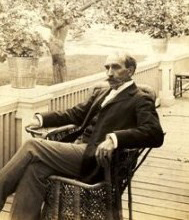
The son had lived with a personal friend in Boston and his personal effects remained there. Savage went to his son’s room and searched the drawer, gathering up all the loose papers. “There were things there which he had jotted down and trusted to the privacy of his drawer which he would not have made public for the world,” Savage ended the story, commenting that he would not violate his son’s privacy by disclosing the contents of the papers.
As further reported by Savage and also recorded in the records of the American Society for Psychical Research (ASPR), the Rev. W. H. Savage, Minot’s brother, and a friend of Harvard Professor William James, the man who discovered Mrs. Piper, sat with Piper on Dec. 28, 1888. Phinuit told him that somebody named Robert West was there and wanted to send a message to Minot. The message was in the form of an apology for something West had written about Minot “in advance.” W. H. Savage did not understand the message but passed it on to Minot, who understood it and explained that West was editor of a publication called The Advance and had criticized his work in an editorial. During the sitting, W. H. Savage asked for a description of West. An accurate description was given along with the information that West had died of hemorrhage of the kidneys, a fact unknown to Savage but later verified.
In a sitting by W. H. Savage two weeks later, West again communicated, stating that his body was buried at Alton, Illinois. He gave the wording on his tombstone, “Fervent in spirit, serving the Lord.” Savage was unaware of either of these facts, but later confirmed them as true.
“Now the striking thing about this lies in the fact that my brother was not thinking of this matter and cared nothing about it,” Minot Savage ended the story, feeling that this ruled out mental telepathy on the part of the medium. “There was no reason for the [apology] unless it be found in simply human feeling on his [West’s] part that he had discovered that he had been guilty of an injustice, and wished, as far as possible, to make reparation, and this for peace of his own mind.”
A Mother’s Grief
There have been many messages from the spirit world suggesting that the grief of loved ones left behind weighs heavily on the departed soul. Such was the message communicated by Olive Thomas (below), a popular Hollywood actress of the silent-screen era, who died of a medication overdose during September 1920.
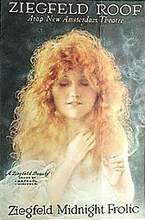
Communicating with J. Gay Stevens, a New York journalist and a member of the ASPR, through medium Chester Michael Grady, Thomas informed Stevens that she needed to get word to her mother that her death was accidental, not a “scandalous suicide” as had been reported by the press. She explained that when she couldn’t sleep she reached for a bottle of sleeping pills but took the wrong bottle, one very similar in appearance. It contained bichloride of mercury, which killed her.
When Stevens contacted Thomas’ mother, the mother wanted nothing to do with him, assuming that, as a journalist, he was just trying to add to the scandal. But Thomas pleaded for Stevens to make further efforts to convince her mother. Over a period of a dozen sittings, Thomas provided Stevens with personal information that had not been public knowledge, hoping that her mother would realize that she was in fact communicating. But the mother still resisted, concluding that as a journalist Stevens had special ways of gathering information. Moreover, her pastor told her that it must be the work of Satan.
Thomas insisted, however, that Stevens keep trying. She then provided some very evidential information that she felt certain would convince her mother that she was alive in the spirit world and communicating. She said that all of her jewelry had been returned to her mother after her death, except one item – her favorite brooch. She told Stevens that the brooch got caught up in the lining of a pocket in the steamer trunk now in her mother’s attic. She also told Stevens one of the pearls, the third from the top on the right, had come out of its setting and was loose in the tissue paper surrounding the brooch.
When Stevens brought this information to Thomas’ mother, the mother reluctantly agreed to go to the attic and search the steamer trunk. Finding the brooch with the loose pearl was enough to convince her that her daughter, not Satan, was actually communicating. She accepted the explanation that her daughter did not commit suicide and this apparently relieved much of her grief and also gave Olive a certain peace of mind.
Change in Will
One of the victims of the 1915 sinking of the Lusitania by a German U-boat was Sir Hugh Lane, an art connoisseur and director of the National Gallery of Ireland in Dublin. He was transporting lead containers with paintings of Monet, Rembrandt, Rubens, and Titian, which were insured for $4 million and were to be displayed at the National Gallery. It was reported by survivors that Lane was seen on deck looking out to Ireland before going down to the dining saloon just before the torpedoes struck.
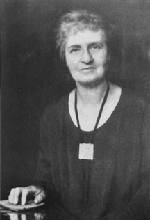
On the very night of the disaster, Hester Travers Smith (above) and Lennox Robinson were sitting at a Ouija board in Dublin, Ireland. As was their usual practice, Travers Smith, the oldest daughter of Professor Edward Dowden, a Shakespearian scholar, and Robinson, a world-renowned Irish playwright, sat blindfolded at the board, their fingers lightly touching the board’s “traveler,” a triangular piece of wood which flies from letter to letter under the direction of a spirit control.
They had experienced several controls over their years of operating the ouija board, but on this particular night the control was a spirit known to them as Peter Rooney. Rooney would be in touch with others on his side and deliver their messages for them if they lacked the experience to communicate on their own. Reverend Savell Hicks sat at the table between Travers Smith and Robinson, copying the letters indicated by the traveler.
“I am Hugh Lane, all is dark,” was spelled out by the traveler, although Travers Smith and Robinson were blindfolded and had no clue as to the message. In fact, they were conversing on other matters as their hands moved rapidly. After several minutes, Hicks told Travers Smith and Robinson that it was Sir Hugh Lane coming through and that he told them he was aboard the Lusitania and had drowned.
While they had heard of the disaster, none of the three was aware that Lane was a passenger on the ship. They continued receiving messages from Lane, who told them that there was panic, the life boats were lowered, and the women went first. He went on to say that he was the last to get in an overcrowded life boat, fell over, and lost all memory until he “saw a light” at their sitting. To establish his identity, Lane gave Travers Smith an evidential message about the last time they had met and talked.
“I did not suffer. I was drowned and felt nothing,” Lane further communicated through Peter Rooney that night. He also gave intimate messages for friends of his in Dublin.
Lane continued to communicate at subsequent sittings. As plans were underway to erect a memorial gallery to him, he begged that Travers Smith let those behind the movement know that he did not want such a memorial. However, he was more concerned that a codicil to his will would be honored. He had left his private collection of art to the National Gallery in London, but the codicil stated that they should go to the National Gallery in Dublin. Because he had not signed the codicil, the London gallery was reluctant to give them up. “Those pictures must be secured for Dublin,” Lane communicated on January 22, 1918, going on to say that he could not rest until they were.
At a sitting that September, Sir William Barrett, the distinguished British physicist and psychical researcher, was present. Prior to the sitting, Travers Smith and Barrett discussed how evidential the messages from Lane were to them, although they could understand why the public doubted. After the sitting started, a man who said he had died in Sheffield communicated first. Then, Travers Smith recalled, Robinson’s arm was seized and driven about so forcibly that the traveler fell off the table more than once. It was Lane, who was upset because of the doubts expressed relative to his communication.
More regrets over a will
On November 10, 1928, Mollie Ross sat with Geraldine Cummins (below), the renowned Irish automatic writing medium, in London. “Mo..Mo…Molly. I am here. I see you,” Molly’s deceased sister, Alice, communicated through Cummins’ hand. “It’s all true. I am alive. The pain went at once. I felt suffocating. Then, just after I got that awful chocking, I felt things were breaking up all about me. I heard crackling like fire and then dimness. I saw you bending down with such a white face and you were looking at me, and I wasn’t there.”
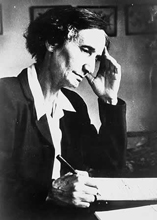
Alice said that she regretted not having treated her second son, who was living in East Africa, as an equal to Ronald. (Molly confirmed that Ronald was her sister’s favorite and that Ronald was favored in Alice’s will.)
Another deceased sister, Margaret, took control of the pencil and said that Alice was having a hard time “managing the words.” Margaret then communicated that Alice also regretted treating her husband badly. Molly noted that this was also very evidential as Alice “bullied her husband dreadfully.”
Margaret then mentioned that Alice still resented the fact that Margaret cut her out of her will and left her share to Charles, their brother, who had no need of the money. This was another very evidential fact to Molly, as it was clearly unknown to the medium. “She hasn’t forgotten yet the way I left my money,” Margaret wrote. “She feels it would have made a difference in her last days.”
Molly told Margaret that Alice’s family was managing financially. “Good,” Margaret replied. “I will tell her that, then she won’t bother about things. The fact of the matter is, she came out of the world with a dark cloud of years of troubled thought about money. It all accumulated and clung about her. But I think now it will be slowly dissipated…All that worrying before her death left her in a very scattered state of mind.”
Borrowed item not returned
Sometime around 1890, Henry Ward Beecher (below) told his friend, Dr. Isaac K. Funk, about a valuable coin, called “The Widow’s Mite,” owned by another friend, Professor Charles West, of Brooklyn, NY. During 1894, Funk, a partner in the American company, Funk & Wagnalls, borrowed the coin from West so that it could be illustrated in The Standard Dictionary, which the company published.
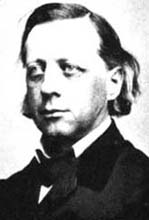
As Funk was to later recall, he gave the coin to his brother, Benjamin, the company’s business manager, and asked him to return it to Professor West after the photographic plate was made. Benjamin then gave the coin, along with another coin, both in a sealed envelope to H. L. Raymond, head cashier of the company. Raymond placed the envelope in the drawer of a large combination safe, where it would remain forgotten for some nine years.
It was in February of 1903 that Funk, also a member of the ASPR, was told about an apparently gifted medium in Brooklyn. On his third visit to this medium, the medium’s spirit control said that Beecher, who was unable to communicate directly, was concerned because of an ancient coin. “This coin is out of its place and should be returned,” the message came through. “It has long been away, and Mr. Beecher wishes it returned, and he looks to you, doctor, to return it.”
Funk pressed for more information and was told that it was in a large iron safe in a drawer under a lot of papers. At his office the next day, Funk had the bookkeeper check the company safe. There, they found the coin in a little drawer in the safe under a lot of papers. Since Professor West had also died, the coin was then returned to his son.
Although Beecher was not responsible for holding on to the coin, he apparently felt some responsibility for it or it may have been that West was unable to communicate and asked Beecher to remind Funk that it has not been returned.
The biggest regret
There are many other stories suggesting that we take our concerns, anxieties, mistakes, and regrets with us to the afterlife, but there have also been a number of communications saying that the biggest regret is not having found out more about the spirit world when alive.
Communicating with Allan Kardec, the distinguished French researcher of yesteryear, a spirit identified as Van Durst, who had been employed by the government before dying at age 88 in 1863, told Kardec that he very much regretted not paying any attention to spirit matters before his death. “If, before quitting the earth, I had known what you know, how much more easy and agreeable would have been my initiation into this other life,” Van Durst said. “I should have known, before dying, what I had to learn afterwards, at the moment of separation; and my soul would have accomplished its disengagement much more easily.”
Michael Tymn is the author of The Afterlife Revealed: What Happens After We Die, Resurrecting Leonora Piper: How Science Discovered the Afterlife, and Dead Men Talking: Afterlife Communication from World War I.
|
Comments
I know there is the afterlife, and different levels of consciousness in this life and into the next greater life. If injury occurs to the degree the breath of life is taken from the human organism, there is no pain in passing though no matter of harshness prevail the flight smooth.
I know returning back to this life, as the body is protected in waves of chock in a matter of time returning our senses never fail us, though we think we ourselves have to some small degree and others greater, the ideas that frequent us as the brain is so programmed our spirit takes flight coming back again is like being grounded to learn more, see more, be more. Giving LOVE in stead of Hate and Hate where it soon disapates and sooner or later we are here to bare the pain of knowing how it does take time before we reach that beautiful place of peacefulness and beyond into the light. Into what a prayer says the Summerland. Light, Love, Peace, Joy, Health & Happiness do not forget Prosperity is a commonplace in our minds behold the TRUTH seek and ye shall find all answers and their meaning revealed as life goes on and on and on and on like the cosmos that we see and can not see.
Light Worlds exist where angels appear and lift us to the Glory and Divine Intelligence Sings and orchestrates a celebration upon our return.
Happy Birthday Everyone!
Lindalee Hulsey, Sat 14 May, 09:19

I FOUND YOUR COMMENTS VERY INTERESTING DENISE.
MY BELOVED PARTNER MADE HER TRANSITION LAST YEAR BUT HER INFLUENCE HAS HAD A VERY CALMING EFFECT ON ME-I’M SAD BUT NOT DISTRAUGHT AND BEST OF ALL I KNOW ONE FINE DAY I’LL CLOSE MY EYES HERE AND OPEN THEM TO SEE HER SMILING AT ME.
BUT YOUR COMMENTS ON MISTAKES. MY PAT THOUGHT I HAD FAR MORE TALENT IN MY PROFESSION THAN I ACTUALLY HAVE.EVEN SO I FEEL I HAVN’T FULLFILLED MY POTENTIAL. BUT IF I HAD BUCKELED DOWN MORE WE WOULDN’T HAVE TRAVELLED SO MUCH AS WE DID AND MAYBE OUR LIVES WOULD HAVE BEEN LESS INTERESTING.
IN THE FINAL ANALYSIS IT’S LOVE ISN’T IT? THAT’S WHAT REALLY COUNTS-THAT’S FOR EVER.
al granville, Sat 11 Sep, 01:11

I must say I agree with the previous comment. While we may think that we’ve made a mistake….in many cases we were offered a learning experience…something to help us grow, change and learn as human beings. Besides…who amongt us can say what is a mistake? Something others may view as a mistake I may have a completely different view about. I don’t think there is anyone qualified to decide if something I have done is a mistake or not. Even things I thought of as a mistake at the time, years later I have had to re-assess and accept it wasn’t a mistake at all. Some of the things I once thought of as “mistakes” brought me to where I am today. And I wouldn’t have it any other way.
Denise, Sat 5 Jun, 10:22

Really interesting! Keep up the good job! ^_^
Coffones, Wed 26 May, 04:35

Do you believe in survival after death and in what form?
I read non-duality and then materializations,evidential messages from deceased
and I am very confused. My ego, does it survive?
EW
Elliot, Sun 23 May, 01:58

This article of Michael Tymn, like all other ones I have read in the past, is most interesting and valuable for any one “living.” Not only Michael Tymn’s reports present to us undeniable evidence that life continues beyond the physical death but also help us to know what to expect after we “die” and how to live now more mindfully having the knowledge of our future when we drop our physical container.
Thank you, Michael, for your wonderful contribution!
Hania Stromberg, Sun 16 May, 10:10

These are fascinating and evidential stories. One problem though: wish you’d supplied citations to your sources for them. One of these years I might want to cite them myself in a publication.
In any case, thanks so much for supplying them!
Sylvia Hart Wright, Sun 16 May, 09:19

Mike,
Nice job, as always!
Keep up the good work,
Richard
Richard, Sat 15 May, 23:05

It’s not that “mistakes” linger on, because there ARE no mistakes… only the soul’s quest for growth. The “lingering” is really about how the growth work we do on earth continues on the Other Side. The work is always being done, because the soul is a perpetual growth machine, so we carry our curriculum with us from one life to another, and the work continues also between lives.
Terri Daniel, Sat 15 May, 09:08

Add your comment
|